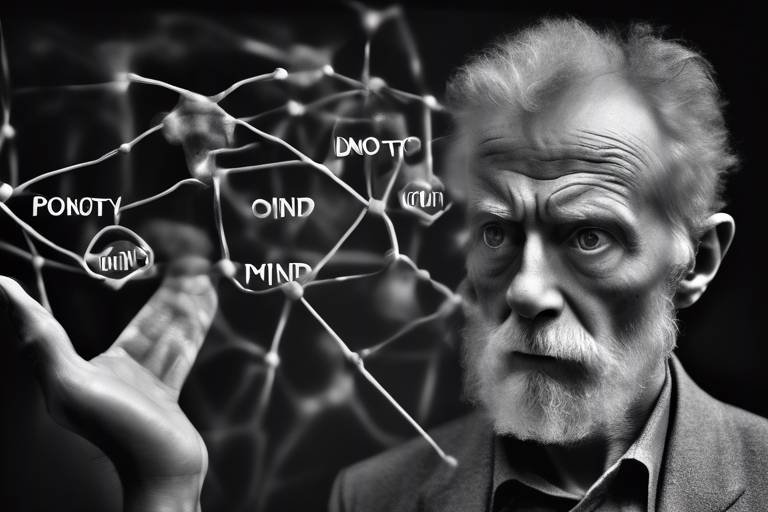The Role of Ontology in Explaining the Nature of Reality
Ontology, a fascinating branch of philosophy, plays a pivotal role in shaping our understanding of existence and reality. When we dive into the depths of ontology, we are not just scratching the surface; we are embarking on a journey that challenges our perceptions and compels us to ask, "What does it truly mean to exist?" This inquiry is crucial because it lays the groundwork for how we categorize everything around us, from the simplest objects to the most complex ideas. Think of ontology as the blueprint of reality, where every entity, concept, and relationship is meticulously defined and examined. It helps us navigate through the intricate web of existence, allowing us to make sense of the world and our place within it.
At its core, ontology seeks to answer fundamental questions about the nature of being. It prompts us to consider the essence of objects: Are they merely physical, or do they have an inherent nature that transcends the material? This exploration is not just an academic exercise; it has profound implications in various fields, including science, where understanding the categories of being can influence research methodologies and interpretations of data. When scientists define their terms and establish clear categories, they are essentially engaging in ontological work, ensuring that their findings are grounded in a coherent understanding of reality.
Moreover, ontology invites us to reflect on the relationships between entities. How do different categories of being interact? What does it mean for something to exist in relation to something else? These questions are not merely philosophical musings; they resonate in our everyday experiences. For instance, consider the relationship between a tree and the environment it inhabits. The tree exists not just as a solitary entity but as part of a larger ecosystem. Understanding these relationships can enhance our appreciation of nature and the interconnectedness of all things.
As we navigate through the realms of ontology, we encounter various perspectives that have emerged over time. Each philosophical tradition offers unique insights, enriching our understanding of existence. From ancient philosophers like Plato and Aristotle, who laid the groundwork for ontological thought, to modern thinkers who challenge and expand these ideas, ontology remains a dynamic field. It evolves as we grapple with contemporary issues, such as identity and the nature of objects in an increasingly complex world.
In summary, ontology is not just a theoretical pursuit; it is a vital framework that influences how we perceive and interact with reality. By examining the nature of being, the categories of existence, and the relationships between entities, ontology empowers us to understand the world more profoundly. It encourages us to question, explore, and ultimately appreciate the intricate tapestry of existence that surrounds us. As we continue to engage with these ideas, we open ourselves to new possibilities and interpretations, enriching our journey through the landscape of reality.
- What is ontology?
Ontology is a branch of philosophy that studies the nature of being, existence, and reality, focusing on what entities exist and how they can be categorized.
- Why is ontology important?
Ontology is crucial for understanding the fundamental nature of reality, influencing various fields such as science, philosophy, and data science.
- How does ontology relate to science?
Ontology helps define concepts and categories in scientific inquiry, ensuring clarity and coherence in research methodologies and interpretations.
- Who are some key figures in ontology?
Notable figures include ancient philosophers like Plato and Aristotle, as well as modern thinkers such as Heidegger and Sartre.

Understanding Ontology
Ontology is a fascinating branch of philosophy that dives deep into the essence of being and existence. Imagine standing at the edge of a vast ocean, peering into the depths to uncover what lies beneath the surface. That’s what ontology aims to do—it seeks to answer profound questions about what entities exist in our universe and how they can be categorized. At its core, ontology grapples with questions like: What does it mean to exist? What kinds of things are there? And how do these things relate to one another?
To grasp ontology fully, one must consider its central themes and concepts. At the heart of ontology are two significant areas of inquiry: the nature of entities and the relationships between those entities. For instance, when we talk about a tree, what exactly do we mean? Is it just the physical structure, or does it encompass the idea of 'tree-ness' that exists in our minds? This distinction leads to discussions about categories of being—what we refer to as ontological categories. These categories can include everything from physical objects to abstract concepts, such as numbers or emotions.
Ontology also plays a crucial role in how we approach knowledge and understanding. For example, when scientists conduct experiments, they rely on a shared understanding of what constitutes an object of study. This shared understanding is rooted in ontological assumptions about the nature of reality. Without a clear ontology, communication breaks down, and the pursuit of knowledge becomes muddled. Thus, ontology is not merely a theoretical exercise; it is foundational to our ability to think critically and engage with the world around us.
In summary, ontology serves as the backbone of philosophical inquiry, shaping our understanding of existence and the myriad entities that populate our reality. As we delve deeper into this subject, we will explore its historical context, modern implications, and its significance in the realm of science. So, buckle up as we embark on this intellectual journey through the intricate landscape of ontology!

The Historical Context
To truly grasp the significance of ontology, we need to take a journey back in time, exploring its roots in ancient philosophy. The evolution of ontological thought has been profoundly shaped by the insights of early philosophers, particularly Plato and Aristotle. Their ideas not only laid the groundwork for future philosophical inquiries but also established a framework that continues to influence contemporary discussions about the nature of reality.
Plato, often regarded as one of the founding figures of Western philosophy, introduced the concept of Forms. He argued that beyond our tangible world lies a realm of perfect, immutable forms that represent the essence of all things. For instance, think about the concept of a "circle." In the physical world, every circle is imperfect, but Plato posited that the true essence of a circle exists in a non-material realm. This idea has had a lasting impact on ontological discussions, as it raises questions about the nature of existence and the reality of abstract entities.
On the other hand, Aristotle took a different approach. He sought to categorize the substances that make up our world, emphasizing the importance of empirical observation. Aristotle's ontology was grounded in the belief that understanding the properties and relationships of physical objects is essential to comprehending reality. His work laid the foundation for many modern ontological theories, pushing the boundaries of how we think about existence and the nature of objects. To illustrate this, consider the following table that summarizes key differences between Plato's and Aristotle's ontological perspectives:
| Aspect | Plato | Aristotle |
|---|---|---|
| Nature of Reality | Abstract Forms | Concrete Substances |
| Method of Inquiry | Dialectical Reasoning | Empirical Observation |
| Focus | Idealism | Realism |
The contributions of these philosophers have sparked a myriad of interpretations and debates throughout history. Their works not only influenced subsequent thinkers but also paved the way for various schools of thought, each grappling with the fundamental questions of existence. As we move forward in our exploration of ontology, it’s essential to recognize how these historical perspectives continue to echo in modern philosophical discussions. They remind us that our understanding of reality is not static; rather, it evolves as we engage with new ideas and challenges.
In conclusion, the historical context of ontology is rich and complex, marked by the profound insights of Plato and Aristotle. Their differing views on the nature of reality, existence, and knowledge have shaped the trajectory of philosophical inquiry and continue to inform contemporary debates. As we delve deeper into modern ontology, we must keep in mind this historical backdrop, for it serves as a foundation upon which our current understanding is built.
- What is ontology? Ontology is a branch of philosophy that investigates the nature of being, existence, and reality.
- Who are the key figures in the history of ontology? The key figures include Plato and Aristotle, whose ideas have significantly influenced ontological thought.
- How does ontology relate to modern philosophy? Ontology in modern philosophy addresses complex issues related to identity, existence, and the nature of objects, evolving from historical theories.

Plato's Influence
Plato's philosophical contributions have had a profound impact on the field of ontology, shaping the way we think about the nature of reality and existence. His theory of forms, introduced in dialogues such as the "Republic" and "Phaedo," posits that non-material abstract forms or ideas represent the most accurate and fundamental reality, while the physical world is merely a shadow or imitation of these forms. This idea can be likened to the way a blueprint represents a building; the blueprint captures the essential features of the structure, but it is not the building itself. In this sense, Plato invites us to consider a realm of perfect forms that transcends our tangible experiences.
Through his allegory of the cave, Plato illustrates how human perception can be limited and deceptive. In this allegory, prisoners are chained inside a dark cave, only able to see shadows cast on the wall by objects behind them. This scenario serves as a metaphor for our understanding of reality; the shadows represent the superficial knowledge we acquire through our senses, while the objects casting the shadows symbolize the deeper truths that can only be grasped through intellectual reasoning. Plato argues that philosophers, through rigorous thought and contemplation, can escape the cave and access these higher truths, thereby enriching our understanding of existence.
Moreover, Plato's influence extends beyond metaphysics into ethics and epistemology, as he believed that understanding the nature of reality was essential to living a virtuous life. He argued that knowledge of the forms leads to a deeper understanding of justice, beauty, and goodness. This perspective has inspired countless thinkers throughout history, prompting discussions about the relationship between knowledge, reality, and moral values. In essence, Plato's ideas encourage us to question the nature of our existence and the categories we use to define it.
To better understand Plato's influence on ontology, it's useful to summarize some key aspects:
- Theory of Forms: Non-material abstract forms represent the highest reality.
- Allegory of the Cave: Illustrates the limitations of human perception and the pursuit of deeper truths.
- Connection to Ethics: Knowledge of reality is essential for understanding moral values.
In conclusion, Plato's ontological framework not only laid the groundwork for future philosophical inquiry but also continues to resonate in contemporary discussions about the nature of reality. His emphasis on the distinction between the material and the ideal challenges us to look beyond our immediate experiences and seek a more profound understanding of existence. As we navigate the complexities of modern philosophy, Plato's insights remain a vital part of the conversation, reminding us that the quest for knowledge is, at its core, a journey toward understanding the essence of being itself.
- What is ontology? Ontology is the branch of philosophy that studies the nature of being, existence, and reality.
- How did Plato influence ontology? Plato introduced the theory of forms, suggesting that abstract forms represent the most accurate reality, which has shaped ontological thought.
- What is the allegory of the cave? It's a metaphor by Plato illustrating how human perception can be limited, showing that what we perceive may only be shadows of the true reality.
- Why is understanding ontology important? Understanding ontology helps us categorize existence, comprehend relationships between entities, and enrich our philosophical and scientific inquiries.

Aristotelian Ontology
Aristotelian ontology represents a significant shift in the understanding of existence and reality. Unlike his mentor Plato, who emphasized the realm of abstract forms, Aristotle grounded his philosophy in the tangible world. He believed that to truly understand existence, one must categorize substances and their properties. This approach laid the groundwork for many modern ontological theories, offering a more empirical perspective on the nature of objects and their existence.
At the core of Aristotle's ontology is the concept of substance. He proposed that substances are the fundamental entities that exist independently. For Aristotle, a substance is not just any entity; it is something that possesses its own essence. This essence is what makes a thing what it is, distinguishing it from other entities. To illustrate this, consider a table. The table is a substance, and its essence might include its material composition (wood, metal, etc.), its shape, and its purpose (to hold items). In this way, Aristotle provides a clear framework for understanding how different entities relate to one another.
Another critical element of Aristotelian ontology is the distinction between primary and secondary substances. Primary substances refer to individual entities, such as a specific dog or a particular tree, while secondary substances are the species or genera to which these entities belong. For example, the dog Fido is a primary substance, whereas the category 'dog' is a secondary substance. This hierarchical categorization allows for a more nuanced understanding of existence, as it recognizes the complexity of relationships between entities.
Aristotle also introduced the idea of accidents, which are properties that can change without altering the essence of the substance. For instance, a car can be painted different colors or modified with new features, but it remains a car at its core. This distinction is vital because it helps clarify what is essential to an entity's identity versus what is merely superficial. In this way, Aristotle's ontology provides a robust framework for analyzing the nature of reality, emphasizing the importance of categorization and the relationships between different entities.
In summary, Aristotelian ontology serves as a foundational pillar for understanding existence and the nature of objects. By focusing on substances, their properties, and their relationships, Aristotle set the stage for future philosophical inquiry. His influence can still be seen today in various fields, including metaphysics, science, and even everyday reasoning. The clarity and structure he provided continue to resonate in contemporary discussions about the nature of reality.
- What is the main difference between Plato's and Aristotle's ontology?
Plato emphasized abstract forms as the true reality, while Aristotle focused on tangible substances and their properties. - How does Aristotelian ontology categorize entities?
Aristotle categorizes entities into primary substances (individuals) and secondary substances (species and genera). - What role do accidents play in Aristotelian ontology?
Accidents are properties that can change without affecting the essence of a substance, allowing for a distinction between essential and non-essential characteristics.

Ontology in Modern Philosophy
In the realm of modern philosophy, ontology has taken on a new life, evolving to tackle the intricate questions surrounding identity, existence, and the essence of objects. Think about it: when we ponder what it means to "be," we're not just contemplating a mere state of existence; we're diving deep into the very fabric of reality itself. This exploration is not just for philosophers holed up in libraries; it resonates with our everyday lives, shaping how we perceive ourselves and the world around us.
Key thinkers have emerged, each contributing unique perspectives to the ongoing ontological discourse. For instance, Martin Heidegger, a prominent figure in existentialism, shifted the focus toward individual existence. He argued that being is not a static concept but rather a dynamic process, influenced by our experiences and choices. This perspective challenges traditional ontological views that often treat existence as a fixed state. Heidegger's famous question, "What does it mean to be?" invites us to reflect on our own existence and the contexts that shape it.
Similarly, Jean-Paul Sartre emphasized the idea of "existence precedes essence," suggesting that individuals create their essence through actions and choices. This radical departure from classical ontology implies that we are not merely defined by pre-existing categories; instead, we are active participants in our own reality. It's like being an artist with a blank canvas—each decision you make adds color and shape to your existence.
On the other end of the spectrum, analytic philosophers have approached ontology with a formal lens, focusing on language, logic, and the relationships between concepts. They argue that clarity in our language is essential for understanding the nature of reality. For instance, philosophers like W.V.O. Quine challenged the distinction between analytic and synthetic truths, suggesting that our understanding of existence is intertwined with our linguistic frameworks. This perspective emphasizes that how we talk about things can fundamentally alter our perception of their existence.
To illustrate this point, consider the following table that summarizes the different approaches to ontology in modern philosophy:
| Philosopher | Key Contribution | Perspective on Existence |
|---|---|---|
| Martin Heidegger | Focus on individual existence and experience | Dynamic and context-dependent |
| Jean-Paul Sartre | Existence precedes essence | Active creation of self through choices |
| W.V.O. Quine | Intertwining of language and reality | Language shapes our understanding of existence |
These diverse perspectives highlight the richness of ontological inquiry in modern philosophy. Each thinker adds a unique brushstroke to the canvas of understanding, creating a vibrant tapestry of ideas that continue to influence not just academic discourse but also our everyday lives. The questions they raise are not just abstract; they compel us to reflect on our own existence and the nature of the world we inhabit.
So, the next time you find yourself pondering the meaning of life or the nature of reality, remember that these discussions are deeply rooted in the rich soil of ontological thought. Each question you ask and every concept you encounter is part of a larger philosophical conversation that has been unfolding for centuries. And who knows? Your own insights might just contribute to the ongoing exploration of what it truly means to exist.
- What is ontology? Ontology is the branch of philosophy that studies the nature of being, existence, and reality.
- How has ontology evolved in modern philosophy? Modern ontology addresses complex issues related to identity, existence, and the nature of objects, influenced by thinkers like Heidegger and Sartre.
- Why is ontology important in science? Ontology helps define concepts and categories that underpin various scientific disciplines, aiding in clarity and understanding.

Existentialism and Ontology
Existentialism, a philosophical movement that gained prominence in the 20th century, fundamentally reshaped our understanding of ontology by emphasizing the individual’s experience and existence. Think about it: instead of focusing solely on abstract categories or universal truths, existentialists like Martin Heidegger and Jean-Paul Sartre directed their gaze inward, questioning what it means to be human in a world that often feels chaotic and indifferent. This shift from the collective to the individual raises provocative questions: What does it mean to exist? How do our choices define our essence?
Heidegger, in his seminal work Being and Time, explored the concept of 'Being' itself. He argued that understanding existence requires an examination of our own being—our “Dasein”, or “being-there.” This term captures the essence of human existence, highlighting that we are not mere observers of reality but active participants. Heidegger posited that our awareness of our own mortality profoundly affects how we experience life. In this light, ontology becomes less about static categories and more about the dynamic, lived experiences of individuals.
On the other hand, Sartre took a more radical approach with his assertion that “existence precedes essence.” This idea suggests that humans are not born with a predetermined purpose; instead, we create our own essence through our actions and choices. For Sartre, the freedom to choose is both a gift and a burden. It places the responsibility of defining oneself squarely on the individual, which can lead to feelings of anxiety and absurdity. This existential freedom challenges traditional ontological views that seek to categorize beings and their properties, as it emphasizes the fluidity and complexity of human existence.
Moreover, the existentialist perspective introduces a critical distinction between being-for-itself (the conscious, self-aware human) and being-in-itself (the existence of objects without consciousness). This differentiation invites us to reconsider the relationships between entities in our world. For instance, how do we relate to objects around us? Do they have intrinsic meaning, or is their significance derived solely from our interactions with them?
In this context, ontology is not just a theoretical exercise; it becomes a practical framework for understanding the human condition. Existentialism urges us to confront the absurdities of life and to find meaning in our unique experiences. It challenges us to engage with our reality actively and authentically, rather than passively accepting pre-defined categories of existence.
Ultimately, the intersection of existentialism and ontology invites a re-examination of how we define ourselves and our place in the universe. It prompts us to ask profound questions, such as:
- What does it mean to truly exist in a world that often feels meaningless?
- How do our choices shape our identity and reality?
- Can we find authenticity in a society that imposes rigid categories upon us?
As we navigate these existential inquiries, we realize that ontology is not merely an abstract philosophical concept but a vital part of our daily lives, influencing how we perceive ourselves and our relationships with the world around us.
- What is ontology? Ontology is the branch of philosophy that studies the nature of being, existence, and reality, focusing on what entities exist and how they can be categorized.
- How does existentialism relate to ontology? Existentialism emphasizes individual existence and subjective experience, challenging traditional ontological views and reshaping discussions about being and reality.
- Who are the key figures in existentialism? Key figures include Martin Heidegger, who explored the concept of 'Being,' and Jean-Paul Sartre, who argued that 'existence precedes essence.'

Analytic Philosophy's Approach
Analytic philosophy has carved out a unique niche in the landscape of ontology, primarily focusing on the precise use of language and logic to unravel the complexities of existence. Unlike its continental counterparts, which often delve into broader existential themes, analytic philosophy seeks to clarify and dissect the very fabric of our conceptual frameworks. This approach is akin to a detective meticulously piecing together clues to form a coherent picture of reality. By prioritizing clarity and argumentative rigor, analytic philosophers aim to establish a more robust understanding of what it means to 'be.'
One of the hallmark features of analytic philosophy is its insistence on the importance of language. Philosophers such as Bertrand Russell and W.V.O. Quine have emphasized that our understanding of reality is deeply intertwined with the language we use. For instance, when we say that something exists, we are not merely making a statement; we are invoking a complex interplay of linguistic conventions and logical structures. This perspective leads to the exploration of how different sentences can represent the same entity and what implications that has for our understanding of existence.
Furthermore, analytic philosophy often employs formal logic as a tool to analyze ontological claims. By using symbols and structured arguments, philosophers can dissect complex ideas into simpler components. This method not only clarifies arguments but also exposes hidden assumptions that may go unnoticed in more narrative-driven philosophical discourses. For example, consider the following table that summarizes key distinctions in ontological categories:
| Category | Description |
|---|---|
| Substance | Entities that exist independently, such as objects or beings. |
| Properties | Characteristics or qualities that substances possess, like color or size. |
| Relations | Connections between substances, such as spatial or causal relationships. |
Moreover, analytic philosophers have also contributed significantly to the discussions surrounding identity and existence. They often explore questions like, "What does it mean for something to be the same entity over time?" or "How do we differentiate between essential and accidental properties?" These inquiries are not merely academic; they have profound implications for fields such as metaphysics and even science. By dissecting these questions, analytic philosophy challenges us to think critically about our assumptions regarding the nature of reality.
In conclusion, the analytic approach to ontology serves as a powerful lens through which we can examine the nature of existence. By emphasizing language, logic, and clarity, it invites us to engage in a more rigorous exploration of what it means to be. This philosophical tradition not only enriches our understanding of ontology but also opens up new avenues for inquiry across various disciplines, making it an indispensable part of contemporary philosophical discourse.
- What is ontology? Ontology is a branch of philosophy that studies the nature of being, existence, and reality.
- How does analytic philosophy differ from other philosophical approaches? Analytic philosophy focuses on clarity, language, and logical analysis, while other traditions may emphasize broader existential themes.
- Why is language important in analytic philosophy? Language shapes our understanding of reality, influencing how we conceptualize and categorize entities.
- What role does formal logic play in analytic ontology? Formal logic helps clarify arguments and expose underlying assumptions in ontological claims.

Ontology in Science
Ontology plays a crucial role in the realm of science, acting as a foundational pillar that helps define the concepts, categories, and frameworks that underpin various disciplines. Imagine trying to build a house without a blueprint; it would be chaotic and unstructured. Similarly, without a clear ontological framework, scientific inquiry can become muddled, leading to confusion about what we are actually studying. By providing a structured way to understand the nature of various entities and their relationships, ontology enables scientists to communicate effectively, share knowledge, and advance their fields.
In science, ontology is not just about what exists; it’s also about how these entities relate to one another. For instance, in biology, we categorize living organisms based on their characteristics, evolutionary history, and ecological roles. This categorization allows scientists to make sense of biodiversity and the interconnections within ecosystems. Without these categories, understanding the complexities of life would be nearly impossible. Ontology serves as the framework that guides these classifications, ensuring that we have a common language and understanding.
Moreover, ontology is instrumental in the development of scientific theories and models. It helps clarify the assumptions underlying these theories and the entities they involve. For example, in physics, ontological questions arise when discussing the fundamental nature of particles and forces. Are particles merely mathematical constructs, or do they have a real existence? Such questions are not just philosophical; they have practical implications for how we conduct experiments and interpret results.
To illustrate how ontology operates within scientific disciplines, consider the following table that outlines the role of ontology in various fields:
| Field | Ontological Focus | Examples of Entities |
|---|---|---|
| Biology | Classification of living organisms | Species, ecosystems, genetic traits |
| Physics | Nature of matter and energy | Particles, forces, fields |
| Social Sciences | Understanding social constructs | Institutions, relationships, cultural norms |
As we delve deeper into scientific inquiry, we encounter the ongoing debate between scientific realism and anti-realism. Scientific realism posits that scientific theories accurately describe an objective reality, while anti-realism questions whether such a reality exists independent of our perceptions. This ontological divide shapes how scientists approach their work and interpret their findings. For instance, a realist might argue that the laws of physics describe the true nature of the universe, while an anti-realist may contend that these laws are simply useful tools for predicting outcomes without necessarily reflecting an underlying reality.
In recent years, the rise of data science has further highlighted the importance of ontology. In this field, ontology helps structure data and knowledge representation, ensuring clear definitions and relationships among data entities. By establishing a well-defined ontology, data scientists can enhance data interoperability, making it easier to analyze and draw meaningful conclusions from vast datasets. This structured approach not only improves the efficiency of data processing but also fosters collaboration across different domains.
In conclusion, ontology is not merely an abstract philosophical concept; it is a vital component of scientific inquiry that shapes our understanding of reality. Whether in biology, physics, or social sciences, ontology provides the framework needed to categorize and relate entities, guiding scientists as they explore the mysteries of the universe. As our scientific endeavors continue to evolve, the role of ontology will undoubtedly remain central in helping us navigate the complexities of existence.
- What is ontology? Ontology is the branch of philosophy that studies the nature of being, existence, and reality.
- Why is ontology important in science? Ontology helps define concepts and categories, providing a structured framework for scientific inquiry.
- How does ontology influence scientific theories? Ontology clarifies the assumptions behind theories and the entities involved, impacting how experiments are conducted and results interpreted.
- What is the difference between scientific realism and anti-realism? Scientific realism asserts that theories describe an objective reality, while anti-realism questions the existence of such a reality independent of our perceptions.

Scientific Realism vs. Anti-Realism
When diving into the philosophical waters of science, one of the most intriguing debates centers around scientific realism and anti-realism. At its core, scientific realism posits that the world described by science is indeed the world as it is, independent of our perceptions or beliefs. This means that the entities and processes described by scientific theories, such as electrons or gravitational waves, exist regardless of whether we can observe them directly. Think of it as believing in the unseen forces of nature, much like believing in the wind; you can't see it, but you can certainly feel its effects.
On the flip side, anti-realism challenges this notion. Anti-realists argue that scientific theories do not necessarily reflect an objective reality. Instead, they suggest that these theories are merely useful tools for organizing our experiences and predicting phenomena. To illustrate, consider a map: it provides a simplified representation of a complex landscape, but it doesn't capture the entirety of the terrain. In this sense, anti-realists maintain that scientific theories are more about our interpretations and less about an ultimate truth.
The debate between these two perspectives raises several essential questions:
- Do scientific theories tell us what the world is like, or are they just useful fictions?
- Can we ever truly know the nature of reality, or is our understanding always mediated by our experiences?
- How do advancements in science impact our beliefs about realism and anti-realism?
To further explore this debate, let’s consider some key points:
| Aspect | Scientific Realism | Anti-Realism |
|---|---|---|
| Nature of Theories | Reflects an objective reality | Tools for organizing experiences |
| Existence of Entities | Entities exist independently of observation | Entities may not exist outside of theories |
| Truth of Theories | Theories can be true or false | Theories are useful or not |
This ongoing discourse is not just academic; it has profound implications for how we understand scientific progress and the nature of knowledge itself. For instance, if we lean towards realism, we might be more inclined to trust scientific findings as definitive truths. Conversely, an anti-realist perspective encourages skepticism, prompting us to question the validity of scientific claims and the frameworks within which they operate. This philosophical tug-of-war continues to shape our understanding of science and reality, making it a captivating area of debate.
- What is scientific realism? Scientific realism is the view that scientific theories accurately describe the world, including entities that exist independently of our observations.
- What is anti-realism? Anti-realism is the belief that scientific theories do not necessarily reflect an objective reality but are instead useful frameworks for understanding our experiences.
- How do scientific realism and anti-realism impact scientific research? These perspectives influence how researchers interpret data, validate theories, and understand the implications of their findings.

Ontology in Data Science
In the fast-evolving world of data science, ontology serves as a foundational pillar that supports the organization and interpretation of vast amounts of information. But what exactly does this mean? Well, think of ontology as a sophisticated map that helps data scientists navigate the complex landscape of data. It defines the types of entities that exist within a particular domain and the relationships between them, ensuring that everyone is on the same page when it comes to understanding data.
One of the key benefits of using ontology in data science is its ability to provide a common vocabulary. When data scientists, analysts, and researchers use the same terms to describe data entities, it minimizes confusion and enhances collaboration. For instance, in the field of healthcare, an ontology might define entities such as patients, diseases, and treatments, along with their interrelationships. This clarity is essential when integrating data from various sources, as it ensures that everyone interprets the information in the same way.
Moreover, ontology plays a crucial role in the development of semantic web technologies. By providing a structured framework for data, ontologies enable machines to understand and process information more effectively. This capability is especially important in today's data-driven world, where automated systems are increasingly relied upon for decision-making. For example, an ontology can help a machine learning algorithm to recognize patterns and make predictions based on structured data, enhancing its accuracy and relevance.
To illustrate the significance of ontology in data science, consider the following table that outlines the key components of an ontology:
| Component | Description |
|---|---|
| Classes | Categories or types of entities within the domain (e.g., Patient, Disease) |
| Properties | Attributes or characteristics of the classes (e.g., Age, Severity) |
| Relations | Connections between classes (e.g., a Patient has a Disease) |
| Instances | Specific examples of classes (e.g., John Doe as a Patient) |
As data continues to grow exponentially, the need for effective data management strategies becomes more critical. Ontology not only helps in structuring data but also aids in data integration and interoperability among different systems. By establishing clear definitions and relationships, ontology facilitates the seamless exchange of information, making it easier to derive insights and support decision-making processes.
In conclusion, ontology is not just a theoretical concept; it is a practical tool that empowers data scientists to make sense of the complexities of data. By providing a structured framework for understanding entities and their relationships, ontology enhances collaboration, promotes clarity, and drives innovation in data science. As we move forward in this data-centric era, the importance of ontology will only continue to grow, shaping the way we analyze and interpret the world around us.
- What is ontology in data science? Ontology in data science refers to a structured framework that defines the types of entities in a domain and their relationships, helping to organize and interpret data effectively.
- How does ontology improve data collaboration? By providing a common vocabulary and clear definitions, ontology minimizes confusion and enhances communication among data scientists and stakeholders.
- Why is ontology important for machine learning? Ontology helps machine learning algorithms understand structured data, improving their ability to recognize patterns and make accurate predictions.
- Can ontology be applied to different fields? Yes, ontology can be applied across various domains, including healthcare, finance, and social sciences, to enhance data management and analysis.
Frequently Asked Questions
- What is ontology?
Ontology is a branch of philosophy that delves into the nature of being, existence, and reality. It aims to answer fundamental questions about what entities exist, how they can be categorized, and the relationships between them. Think of it as a map that helps us navigate the complex landscape of existence.
- How did historical figures like Plato and Aristotle influence ontology?
Plato introduced the theory of forms, suggesting that non-material abstract forms represent the most accurate reality. This idea paved the way for later ontological discussions. Aristotle, on the other hand, focused on categorizing substances and their properties, laying the groundwork for many modern ontological theories. Together, they shaped the foundational ideas that continue to influence contemporary thought.
- What role does ontology play in modern philosophy?
In modern philosophy, ontology has evolved to tackle complex issues related to identity, existence, and the nature of objects. Thinkers like Heidegger and Sartre challenged traditional views by emphasizing individual existence and subjective experience, while analytic philosophers focused on language and logic to clarify the nature of reality. This evolution reflects our ongoing quest to understand what it means to exist.
- How is ontology relevant in scientific inquiry?
Ontology is crucial in scientific inquiry as it helps define concepts and categories that underpin various disciplines. It plays a significant role in debates like scientific realism versus anti-realism, questioning whether scientific theories truly describe reality or if they are merely constructs of our perceptions. This philosophical underpinning is essential for grounding scientific exploration.
- What is the significance of ontology in data science?
In data science, ontology aids in structuring data and knowledge representation. It ensures clear definitions and relationships among data entities, which is vital for effective analysis and understanding. By providing a framework for organizing information, ontology enhances our ability to derive meaningful insights from complex datasets.



















